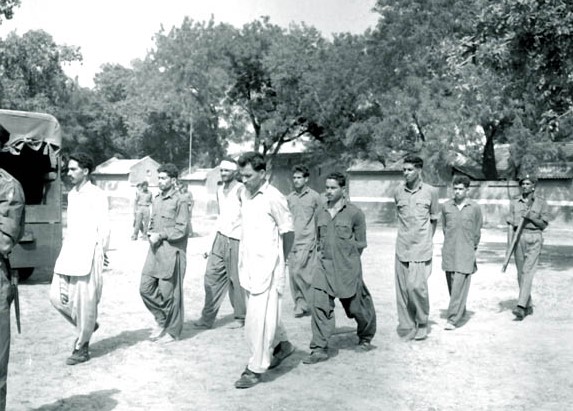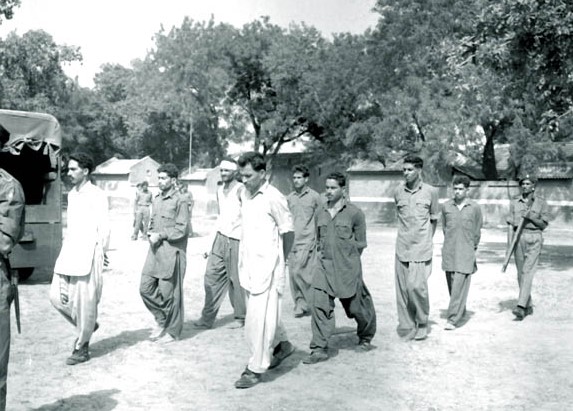Anisha Dutta/The Guardian
New Delhi, March 8: India’s first prime minister, Jawaharlal Nehru, was urged by his most senior general to agree to a ceasefire with Pakistan in 1948, the Guardian can reveal after viewing letters on Kashmir that have been kept classified in India for decades.
The correspondence from the then commander-in-chief, Gen Sir Francis Robert Roy Bucher, will have significant political ramifications for the current nationalist government in Delhi, which has discredited Nehru’s decision to come to a compromise on the status of disputed Kashmir as an ill-informed “blunder”.
Narendra Modi’s government has used that reasoning to justify stripping Kashmir of special status in 2019 and tightening its grip over the region.
However, a series of letters – which Modi’s administration has sought to keep classified – show Nehru was in fact acting on advice from his most trusted adviser in the army, who warned India would not be able to withstand continued military operation in Kashmir for long, and a political compromise was needed.
In his message to Nehru dated 28 November 1948, Bucher warned of fatigue among Indian troops in Kashmir, adding that an “overall military decision was no longer possible”.
“Army personnel evince two weaknesses, lack of training in the junior leaders, tiredness and ennui in the other ranks … In brief, the army needs respite for leave, training, and vitalising.”
Nehru, in response, raised concerns over reports that Pakistan intended within weeks to bomb Indian positions from the sky. Meanwhile, Pakistan was building roads to maintain and advance its positions.
In another letter to Bucher sent on 23 December 1948, Nehru wrote: “It is clear to me that we cannot rely on Pakistan remaining on the defensive.” He added: “In the event of Pakistan continuing their persistent shelling and offensive operation and our not being able to check this there, there is every likelihood of war taking place with Pakistan.”
In a later letter dated 28 December, Bucher made his position clear: “I am afraid we cannot take military action to stop every road-building operation by Pakistan. May I suggest a political approach to this problem.”
The war ended on 1 January 1949 with a ceasefire arranged by the United Nations, and later that year Nehru provided special status to the state of Jammu and Kashmir, giving the region autonomy.
Over the decades, India and Pakistan have fought three more wars over the Kashmir issue and the ensuing border dispute. However, the measures in article 370 provided by Nehru were seen by Kashmiris as crucial to protecting their rights in the India-controlled parts of the Muslim-majority state, and also reduced tensions with Muslim-majority Pakistan.
But in 2019, under the leadership of Hindu nationalist Modi, Delhi formally revoked the state’s constitutional autonomy, in an attempt to integrate it fully into India. The decision tightened the government’s grip over the region and stoked anger and resentment.
The ruling Bharatiya Janata party justified its decision by suggesting Nehru had made a mistake, blaming him for not seeking to grab more territory from Pakistani forces. The India home affairs minister, Amit Shah, in 2019 said the decision to reach a UN-mediated compromise was Nehru’s “biggest mistake”, criticising it as a “Himalayan blunder”.
“What was the need to announce a ceasefire when we were about to win the war?” Shah said.
However, the Bucher papers, as they are known in India, suggest Nehru was acting on informed advice from his military officers.
Bucher, a British officer, was chosen by post-independence India to become commander-in-chief of the Indian army due to his familiarity with Indian military operations and his ability to bridge the gap between British and Indian military personnel. He served between 1948 and 1949 until his retirement and was the last non-Indian to hold the top military post.
The Guardian revealed last month that Modi’s government was seeking to prevent the declassification of some of the Bucher papers, describing them as “sensitive”.
A recent foreign ministry document, seen by the Guardian, said the contents of the papers should not be declassified yet. It said the papers broadly examined the “state preparedness of Indian armed forces stationed in Kashmir, in the backdrop of the India-Pakistan war (1947-48)” and “concerns expressed by Nehru regarding offensive military actions undertaken by Pakistan”.
For several decades, the papers have been kept in New Delhi at the Nehru Memorial Museum and Library, an autonomous body under India’s culture ministry since 1970. Over the years, several unsuccessful attempts have been made by activists to declassify the papers.
Some copies of parts of the Bucher correspondence are also kept at the National Army Museum of London.
The Guardian has contacted the Indian foreign ministry for comment.
END
The post Kashmir letters cast doubt on claims Nehru blundered by agreeing ceasefire appeared first on NewsIn.Asia.




